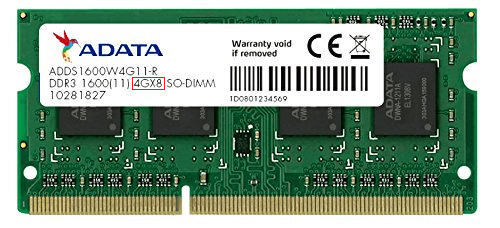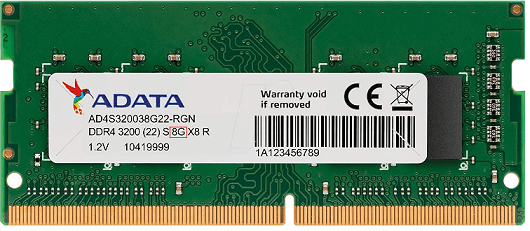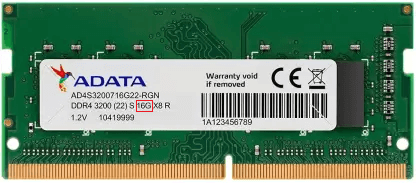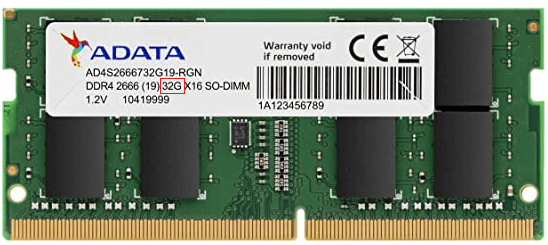RAM, which is an essential component, helps to speed up the process while you are playing games or running different applications in your system. But, how does it work? And, how much RAM do you need to avoid overkill? If these questions often pop up in your mind, this is the place where you will get all the answers. Plus, we will discuss some alike topics like RAM specs, RAM terminology, common RAM capabilities, etc. So, we suggest you read the full article to get the maximum knowledge about this important component.
What Is RAM?
An introduction of RAM is of utmost importance before we learn about its applications and features. So, here is a quick definition: A RAM or Random Access Memory is nothing but an internal memory of the CPU that stores data temporarily that your PC needs to access. This means, when you operate your PC or any application, your OS sends data to the RAM and once you close your PC or application, all the data gets cleared. A RAM is used in everyday computer tasks, from browsing the internet to running high-end games. It allows a user to switch between any applications, and the speed at which the applications are switched depends on how much RAM your OS has. Low RAM means your PC will get slow if you open several applications. This is why sufficient RAM is required if you need to carry out intensive creative tasks like video editing, rendering, and of course gaming. Talking about games, RAM is majorly discussed in the gaming community so, let us dive deeper and learn the importance of RAM when playing games.
How Does RAM Play Into Gaming?
What RAM does while you play a game is store content and variables temporarily in its memory so that it can quickly transfer the info from the main storage device to the CPU. Understand it this way – when you launch a game on your PC, RAM becomes an active participant in this process as it receives data or info from the running game. Your game’s data is store in either SSD or hard drive, but constantly pulling data from there could slow down the process. This is where RAM comes in aid as it is faster and stores the game’s data temporarily. If your OS has low RAM, this means the temporary data storage will be less, thus data transfer will be poor. This could result in a lower frame rate, choppier texture, more loading time, and a bad gaming experience. That being said, it is not only the RAM that could affect your gaming experience. Other components like CPU, GPU, or any kind of defect in the hardware or software could result in poor data transfer, thus a bad gaming experience.
RAM Terminology
Here are three terminologies of RAM that you should know:
Memory – A computer uses different data storing technologies like RAM (temporary) and ROM (permanently) and is referred to as memory. RAM Memory is the dedicated area where data from your system is loaded for the short-term to quickly get access. RAM – RAM is the physical component of a computer system that is designed to store the computer’s memory temporarily. Bigger RAM will allow you OS to store and process more data, thus if you are playing high-end games or running multiple application simultaneously your PC will be efficient. GB – Gigabytes or GB is the term that is used to measure the data storage of a gaming console, computer, smartphone, tablet, or other such devices. The higher the GB in a computing device, the more capable it is to store the data.
Is More RAM Better?
There is a fine line between overdoing and underdoing your PC. If you have applications and games that require 8GB RAM Memory to smoothly function, then installing a 32GB RAM Memory is simply a waste as most of the RAM will go unused. Here is an illustration – Suppose you want to fill 100 liters of water in a 50-liter container without wastage, the water will spill out and you won’t be able to achieve the objective. But, if you have a 500-liter container to store 100-liter water, then most of the space of that container will be wasted. Most of the enthusiastic gamers and hobbyist editors like to install more RAM Memory in their OS than required. Though it is a good idea to have extra RAM for the long term, in many cases most of the RAM Memory goes in vain.
How Much RAM Do I Need for Gaming?
In today’s time, most of the newly launched games demand higher RAM Memory. Here is a list of some high-end pc games of recent years and their RAM requirement. The content in the above table clearly shows that 8GB is the baseline for most PC games. According to various tests done by developer teams, 8GB – 16GB are going to be a normal RAM requirement for upcoming games. This is because PC games are becoming more advanced and complex, thus bigger RAM Memory will be required to smoothly run them.
What Are The Most Common RAM Capacities?
Most of the home computers today are loaded with either 4, or 8 GB RAM Memory. However, some high-end PCs come with 16, 32, or sometimes 128 GB RAM. Let us break down some commonly used RAM and see how much capacity they hold.
4GB RAM – This is commonly used in domestic and industrial sectors that supports 32-bit OS. In 2021, this is not sufficient enough to run games unless you are playing old games.
8GB RAM – As discussed before, 8GB RAM is the baseline set for computer gaming. It can easily run almost every game launched to date; however, you will have to upgrade if you have a higher memory-intensive project to take care of.
16GB RAM – This is the most favorable RAM Memory in today’s time. 16 GB is more than enough if you want to run high-end games, edit videos, or perform memory-hungry tasks.
32GB RAM – In the majority of cases, 32 GB RAM can overkill. However, people, especially competitive gamers are upgrading to 32 GB to build a future-proof OS.
Single Module vs Multiple Modules
RAM comes in three variants – single-channel, dual-channel, and multiple-channel modules. Multiple channel modules are better than a single channel module as it offers better performance. That being said, the performance that you expect after using both modules will not be drastic. This is because, just like other essential components, it comes down to what you are using your PC for. If you are using your PC for browsing the internet, using Microsoft office, or watching moves, etc. you will not feel too much difference between single and multiple channel module. However, if you are a graphic designer, gamer, or video editor, who uses a PC for an intensive project, you will feel the difference.
Understanding RAM Specs for Gaming
It is not just the RAM Memory that determines whether you will get a smooth FPS rate, RAM speed also plays an equal role. But, what exactly is a RAM speed? RAM speed is the measurement of data transfer from RAM to other components. It is measured in Megahertz (MHz) i.e. mega transfer per second. The speed of a RAM is determined by a standard set by an organization named JEDEC. According to JEDEC, 16 gigs of DDR4 is the optimal option if you want to play high-end PC games in 1080p x 60fps or above. That being said, there are different scenarios where RAM speed will not tremendously affect your gaming performance. Let look at some of these scenarios.
DDR Designations
Every stick of RAM comes with two things – version number and DDR. DDR (Double Data Rate) transfers the data twice as fast as regular RAM chips. This technology (DDR) has gone through advancements and has different generations. DDR2, DDR3, DDR4, DDR5. DDR2 is not being used in this generation, only DDR3 and DDR4 are common. DDR4 is the current standard and DDR5 is not commercially available in the market. As these technologies are of different generations, they are not compatible with each other. This means if you have a motherboard with a DDR3 slot, you can’t plug DDR4 into the board. If you are planning to upgrade your system, sticking with DDR4 is advisable as they are the standard at this time.
Clock Speed
Clock speed is nothing but a measurement of time per second a RAM can access its memory. Clock speed is measured in megahertz. A common misconception is having a fast clock speed could improve your PC’s performance drastically, it can, but you won’t find a noticeable difference. It is important to note that the clock speed of RAM and DDR are correlated. You will not find higher numbers on DDR2. This means, if you stick with the standard stick of RAM (DDR4) you will get an optimal speed. Mixing sticks of RAM with different clock cycles will eventually lower the performance.
Number of Sticks
A RAM gets plugged in the mainboard of a PC to integrate other components and transfer data quickly. To make the process even faster, most motherboards come with dual-channel memory slots. This configuration lets you attach two RAM sticks simultaneously. Suppose, you want to install 8GB of RAM in your OS, and you already have a dual-channel, Now, to take advantage of dual-channel memory, install two RAM sticks of 4GB with the same clock speed and DDR rather than installing one single 8GB stick of RAM. Some motherboards come with quad-channel memory, so if you want to install 8GB of RAM, it is advisable to install 4 sticks of 2GB RAM. This will not only utilize the channel memory but will also make it easier to replace the RAM stick if it goes bad.
The Final Word
Let us have a recap of what we’ve learned in this article – RAM is an important component that stores data temporarily for PC to access. This is commonly discussed in the gaming community or where intensive tasks are operated. Here below are some basic ideas of how much RAM do you require according to your everyday work.
4GB – This memory is good for smartphones or tablets, but for PCs, 4GB is not going to cut it anymore. As there are more complex games in development that will demand higher RAM Memory. 8GB – According to developers and tech geniuses, 8GB of RAM is the standard requirement for PCs as it can run high-end games smoothly plus, all your casual applications can run simultaneously. 16GB – If you have a good budget and want to experience gaming even better, 16 GB is optimal for you. Upcoming games will call for more than 8 GB of RAM Memory, so if you are planning to upgrade your OS, 16 GB RAM is the best bet. 32GB – To future-proof your OS, 32 GB RAM is the perfect option. However, this may not be suitable for all users, because this amount of RAM can overkill.
At last, the decision is all yours. Many brands in the market can provide the desired amount of RAM. Good luck! Comment * Name * Email * Website
Δ









![]()